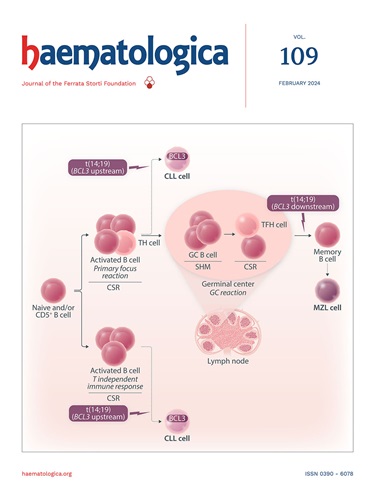Interim analysis of a multicenter study on patient-guided dose reduction of tyrosine kinase inhibitors in chronic myeloid leukemia: the RODEO study.
IF 7.9
1区 医学
Q1 HEMATOLOGY
引用次数: 0
Abstract
Patient-guided dose reduction, as explored in the RODEO study, offers a promising approach to alleviate the burden of tyrosine kinase inhibitor (TKI) therapy in chronic myeloid leukemia (CML). Supported by shared decision-making (SDM) and a patient decision aid, this strategy aims to reduce TKI toxicity while maintaining effectiveness. This interim analysis evaluates its effectiveness at six months, focusing on intervention failure, i.e., TKI dose re-escalation due to loss of major molecular remission (MMR) of BCR::ABL1 (>0.1%IS) or expected loss of MMR, and patient-reported healthrelated quality of life (HRQoL) and symptom burden. The SDM-process and decisional conflict are also evaluated. This is a prospective, single-arm, multicenter trial including 148 patients with chronicphase CML in at least MMR. Patients and their treating hematologists were engaged in an SDMprocess and selected a reduced TKI dose. BCR::ABL1 monitoring was conducted regularly; HRQoL and symptom burden was assessed using EORTC QLQ-C30, QLQ-CML24, and IL156. SDM and decisional conflict were evaluated via SDM-Q-9, SDM-Q-Doc, and the Decisional Conflict Scale. Of 146 patients analyzed, 2.8% experienced intervention failure at six months. Modest statistically significant improvements were seen in multiple symptom scales. SDM was well-evaluated, with low decisional conflict by patients. Patient-guided dose reduction appears safe and beneficial at six months followup.慢性髓性白血病患者指导下酪氨酸激酶抑制剂剂量降低的多中心研究中期分析:RODEO研究。
在RODEO研究中,患者引导的剂量减少为减轻慢性髓性白血病(CML)中酪氨酸激酶抑制剂(TKI)治疗的负担提供了一种有希望的方法。在共同决策(SDM)和患者决策辅助的支持下,该策略旨在降低TKI毒性,同时保持有效性。该中期分析评估了其在6个月时的有效性,重点关注干预失败,即由于BCR::ABL1 (>.1 % is)的主要分子缓解(MMR)丧失或MMR预期丧失而导致TKI剂量再次升高,以及患者报告的健康相关生活质量(HRQoL)和症状负担。并对sdm过程和决策冲突进行了评价。这是一项前瞻性、单组、多中心试验,包括148例至少MMR的慢性CML患者。患者及其治疗血液学家参与sdm过程,并选择减少TKI剂量。BCR:定期进行ABL1监测;采用EORTC QLQ-C30、QLQ-CML24和IL156评估HRQoL和症状负担。通过SDM- q -9、SDM- q - doc和决策冲突量表对SDM和决策冲突进行评估。在分析的146例患者中,2.8%的患者在6个月时经历了干预失败。在多个症状量表中观察到适度的统计学显著改善。SDM评价良好,患者决策冲突低。在6个月的随访中,患者指导的剂量减少似乎是安全有益的。
本文章由计算机程序翻译,如有差异,请以英文原文为准。
求助全文
约1分钟内获得全文
求助全文
来源期刊

Haematologica
医学-血液学
CiteScore
14.10
自引率
2.00%
发文量
349
审稿时长
3-6 weeks
期刊介绍:
Haematologica is a journal that publishes articles within the broad field of hematology. It reports on novel findings in basic, clinical, and translational research.
Scope:
The scope of the journal includes reporting novel research results that:
Have a significant impact on understanding normal hematology or the development of hematological diseases.
Are likely to bring important changes to the diagnosis or treatment of hematological diseases.
 求助内容:
求助内容: 应助结果提醒方式:
应助结果提醒方式:


